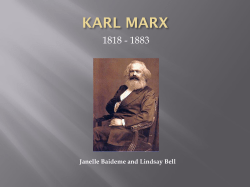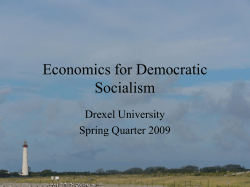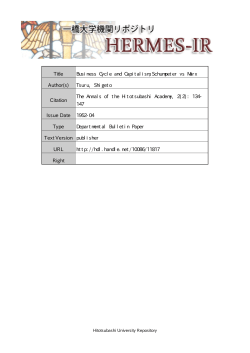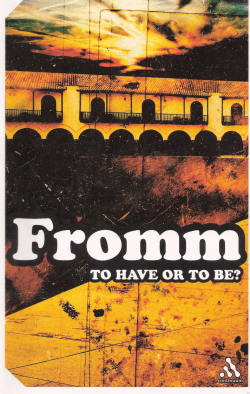
Karl Marx Ethan Fishman
Karl Marx Ethan Fishman Life • Karl Marx has had profoundly practical impact on world politics in late 19th and early 20th century. • He was born on May 5th, 1818 in Trier to a Lutheran converted family descended from Jewish Rabbis and Scholars. • Marx began his education at the University of Bonn and then transferred to continue his studies at the University of Berlin where he came under the influence of Hegelian philosophy. Life - Continued • Georg Hegel argued that human events progress dialectically through periods of stability and violence driven by the idea or spirit of history. • The young Hegelians, a group to which Marx belonged, antagonized the Prussian monarchy by arguing that the time of Prussian absolutism was over. • Marx began a journalistic career in 1841 working for the Rheinische Zeitung after completing his doctorate. Because of its critical tone, the journal was shut down by the government. Life - Continued • Marx fled to Paris and began work on The Economic and Philosophic Manuscripts of 1844, a work that displays the influence of Ludwig Feuerbach and is associated with an understanding of Marx as a humanist as opposed to the historical determinist contained in later works. • In 1843, he married Jenny Westphalen and later met Friedrich Engels (1820 – 1895), a wealthy textile manufacturer who became Marx’s lifetime intellectual collaborator and financial supporter. Life - Continue • For his work with the Franzoesische Jahrbuecher, Marx was expelled from France. • He settled in Brussels and joined the Communist League. • During this time, Marx published the Communist Manifesto of 1848 that explained the difference between the League’s philosophy and the philosophy of Saint Simon, Fourier, Owen, Bakunin, and Proudhon. Life - Continued • The Manifesto ends with these famous words: – “Let the ruling class tremble at a Communist revolution. The proletarians have nothing to lose but their chains. They have a world to win. Working men of all countries, unite!” • Marx’s words appeared prophetic as revolutions and class warfare swept Europe. • Marx emphasized practice (praxis) the transformative power of philosophy. – “The philosophers have only interpreted the world, in various ways; the point, however, is to change it.” Life - continued • In 1849, Marx fled the forces of reaction to London where he lived in poverty and had three children die. • Marx’s time in London was spent in the reading room of the British Museum and in organizing the International Workingmen’s Association. • Isaiah Berlin paints a picture of Marx highlighting his strength of convictions and his intolerance for those not convinced by his logic. • Marx died in 1883. Engels noted: – Fighting was his element. And he fought with a passion, a tenacity and a success which few could rival… (H)e died, beloved, revered and mourned by millions of revolutionary fellow workers – from mines of Siberia to the coasts of California, in all points of Europe and America…. His name will endure through the ages, and so also will his work. Questions for Reflection What did Marx mean by Praxis? Historical Materialism • Marx turns Hegel up side down and examines the dialectic as a material process (historical materialism) as opposed to a spiritual or metaphysical process. • This material dialectic unfolds in the following manner: – Thesis establishes stability – Anti-thesis violently challenges existing order – A synthesis emerges establishing a new stable order Historical Materialism - continued • The stages of Marx’s materialist conception of history: – – – – – Primitive Communism Slavery Feudal Lords Capitalism Advanced Communism • Engel’s Socialism: Utopian and Scientific articulated the fundamental importance of economics to understanding human history. – … The final causes of all social changes and political revolutions are to be sought, not in men’s brains, not in men’s better insight into eternal truth and justice, but in changes in the modes of production and exchange. They are to be sought not in philosophy, but in the economics of each particular epoch. Historical Materialism - continued • The forces of production (technology people use) and the relations of production (the division of labor) are exploitative as long as classes exist. • These forces and relations are the substructure (economic conditions) that produces the superstructure of society (political, social, religious, legal, educational, and cultural institutions). • Marx’s position can be interpreted as deterministic or humanistic. Totalitarians have tended to emphasize inevitability, whereas his collaborator, Engels, takes a more nuanced approach. The Materialist Conception of History, From German Ideology The first historical fact is … the production of material life itself. Therefore in any interpretation of history one has first of all to observe this fundamental fact in all its significance and all its implications and to accord it its due importance. It is well known that the Germans have never done this, and they have never, therefore, had an earthly basis for history and consequently never a historian. Marx and Determinism, From A Contribution to the Critique of Political Economy In broad outlines Asiatic, ancient, feudal, and modern bourgeois modes of production can be designated as progressive epochs in the economic formation of society. The bourgeois relations of production are the last antagonistic form of the social process of production – antagonistic not in the sense of individual antagonism, but of one arising from the social conditions of life of the individuals; at the same time the productive forces developing in the womb of bourgeois society create the material conditions for the solution of that antagonism. The social formation brings, therefore, the prehistory of human society to a close. Questions for Reflection Would you describe Marx as a humanist or a determinist? Why? Marxist Anthropology • Lewis Morgan (1818-1881), an American anthropologist argued that primitive peoples lived in communism offering Marx a starting point for his understanding of dialectical evolution. • Specialization led to slavery and technological innovation led to feudalism. • Capitalism replaced feudalism because of similar technological advances creating two conflicting classes, the bourgeoisie (the exploiters) and the proletariat (the exploited). Marxist Anthropology - Continued • As economic crises multiply, the proletariat will unite and overthrow the bourgeoisie ushering in advanced communism. • Advanced communism will be similar to primitive communism with the addition of material abundance supplied by a higher technological base. • The “false consciousness” of exploitative morality will be replaced by an authentically human morality. • Religion will be unnecessary since it was merely a tool exploiters used to control the exploited. Marxist Anthropology - Continued • Traditional family relationships will also go by the way side as the material reality of those relationships is displaced by the new mode of production and distribution. • The new mode of production will enable each to contribute according to ability and take according to need. • There will be an interim period before advanced communism involving the dictatorship of the proletariat where violence and force are used to bring about advanced communism. • Marx’s embrace of the necessity of revolution and the ensuing violence and force led him to reject thinkers who did not see such a necessity as utopian socialists. Engels, Anti-Duhring, 1878 We therefore reject every attempt to impose on us any moral dogma whatsoever as an eternal, ultimate and forever immutable ethical law on the pretext that the moral world, too, has its permanent principle which stand above history and the differences between nations. We maintain on the contrary that all moral theories have been hitherto the product in the last analysis, of the economic conditions of society obtaining at the time… A really human morality which stands above class antagonisms and above any recollection of them becomes possible only at a stage of society which has not only overcome class antagonisms but has even forgotten them in practical life. Questions for Reflection Was Marx mistaken in not calling for a strict political accountability of the political leadership to the rank-and-file proletariat? Theory of Alienation • Humans find the cosmos as a hostile place. – For Hegel, thinking about the universe and framing it within concepts offers the peace of mind we seek. – For Marx, creative labor to produce what we need for survival is the way for overcoming this alienated experience. Class structure and the division of labor negate possibilities of creativity and exacerbate human creativity. • Capitalism combats creative labor in three ways: – By separating labor from its products, capitalism robs workers of pride in their craft. – Avaricious competition turns workers against each other and replaces quantity for quality as innovation and creativity are excluded from work. – The bourgeoisie maximally exploits the worker bringing the quality of the worker’s life to a low point in human history. Theory of Alienation - Continued • Despite his criticisms, Marx does not consider capitalism an immoral system. • According to his understanding of history, capitalism is a necessary stage to bring about advanced communism. • After the dictatorship of the proletariat passes, the alienation of the workers will cease. • Machines will deal with the tedium and boredom of labor and man will become “the real, conscious lord(s) of Nature.” Questions for Reflection What did Marx think of democratic socialists such as the Labor Party in England? The Alienation of Labor, From Economic and Philosophic Manuscripts As a result, therefore, man (the worker) no longer feels himself to be freely active in any but his animal functions – eating, drinking, procreating, or at most in his dwelling and in dressing-up, etc.; and in his human functions he no longer feels himself to be anything but an animal. What is animal becomes human and what is human becomes animal. Engels On “The Kingdom of Freedom,” from Socialism: Utopian and Scientific With the seizing of the means of production by society, production of commodities is done away with, and, simultaneously, the mastery of the product over the producer. Anarchy in social production is replaced by systematic, definite organization. The struggle for individual existence disappears. Then for the first time man, in a certain sense, is finally marked off from the rest of the animal kingdom, and emerges from mere animal conditions of existence into really human ones. The whole sphere of the conditions of life which environ man, and which have hitherto ruled man, who for the first time becomes the real, conscious lord of Nature, because he has now become master of his own social organization. Questions for Reflection Do you think that Marx has a realistic view of human nature? Industrial Reform • The theme and reality of alienated labor was a powerful enough reality to be captured in the art work of Charlie Chaplin in the film Modern Times. • After World War II, some companies organized workers into small teams that shared responsibility for creating a final product. • This innovation was adopted in the Scandinavian countries, Japan, and the United States. • Marx would likely reject such reform as a deceitful practice by capitalists to enhance profits that would merely delay the inevitable evolution of advanced communist society. Theory of Surplus Value • Marx used John Locke’s labor theory of value to demonstrate how capitalists were taking the surplus value of labors efforts to empower themselves. • As the capitalists sought to increase profits, they would rely more and more on constant capital (machinery, buildings, and raw materials). • As competition intensifies more and more workers will be released and many defeated capitalists will join the ranks of the proletariat. • Eventually the masses in desperate circumstances will rebel and overthrow the capitalist mode of production and transfer economic ownership and political control into public hands. Questions for Reflection Can reform of the industrial workplace forestall the proletarian revolution Marx predicts? Marxism-Leninism • Marxists in Russia were faced by the problem that their society was too backward for a communist revolution. • V.I. Lenin (1870-1924) and Leon Trotsky (1877 -1940) argued some societies could skip capitalism and move toward advanced communism. Lenin further argued discontented peasants could substitute for the proletariat as the engine of the necessary revolution. • Lenin argued a dictatorship of the communist party over the peasants and the proletariat would be necessary to prevent them from sliding into a stagnant “trade union mentality.” Marxism-Leninism - continued • Lenin opposed anarchists dismantlement of administrative apparatuses and argued that the communist were ready to subordinate, control, and manage human beings as they were into advanced communism. • Lenin’s unleashing of force and violence with no definitive end point created a legacy that would become increasingly dark as Stalin (1879-1953), Mao Zedong (1893 -1976), Kim Il-Sung (1912-1994), Ho Chi Minh (1890-1969), Fidel Castro (1926 – today), and Pol Pot (1925 – 1998) unleashed murder and oppression to bring complete equality to the earth. “The Knell of Capitalist Private Property,” From Capital, 1867 Along with the constantly diminishing number of the magnates of capital, who usurp and monopolize all advantages of the process of transformation, grows the mass of misery, oppression, slavery, degradation, exploitation; but with this too grows the revolt of the working class, a class always increasing in numbers, and disciplined, united, organized by the very mechanism of the process of capitalist production itself. The monopoly of capital becomes a fetter upon the mode of production, which has sprung up and flourished along, and under it. Centralization of the means of production and socialization of labor at last reach a point where they become incompatible with their capitalist integument. This integument is burst asunder. The knell of capitalist private property sounds. The expropriators are expropriated. Questions for Reflection Do you agree with Marx that only human labor, and not machines, can produce economic value? Herbert Marcuse • Herbert Marcuse (1898 – 1979) one of Marx’s most original late twentieth century interpreters imagined the life after alienation as being dedicated to creative labor, immersed in satisfaction of a dynamic culture, and characterized by a liberated sexuality. • The proletariat has been barred from this potential by being bought off by a one-dimensional consumer society. • The marginalized in that society offered a potential source for the needed Marxian revolution. • Needless to say, Marcuse was immensely popular with the Hippie generation of the 1960s and 1970s. Conclusion • If Marx is a humanist critical of human evils, he is not original. • If Marx is an economic determinist, he is original but is troubled by necessary role of technological and economic forces to make a new mode of production recognizable within the superstructure of society. • It is also interesting to ponder why the dynamic force of the dialectic, so active throughout history would eventually stop. Conclusion - Continued • There are strong parallels in Marx’s thought with the religion he rejects. – The dictatorship of the proletariat and the Jews 40 years in the desert to be prepared for the promised land. – The communist revolution is an apocalypse followed by advanced communism, which is an earthly heaven. – Man saves himself and Marx is the prophet of this self-salvation. • Does life always get better and have technological innovations tended toward progress or have there been regresses in human history. – Holocaust – Atomic Bomb • Many positive changes have occurred without revolution. Must a revolution inevitably come? Questions for Reflection Why is Marxism sometimes described as a secular religion? Questions for Reflection To what extent have capitalist societies met the standards of political justice outlined by Marx in his Communist Manifesto? New Orleans Did the Hurricane Katrina tragedy on the Gulf Coast illustrate the evils of capitalism about which Marx warns?
© Copyright 2025



















